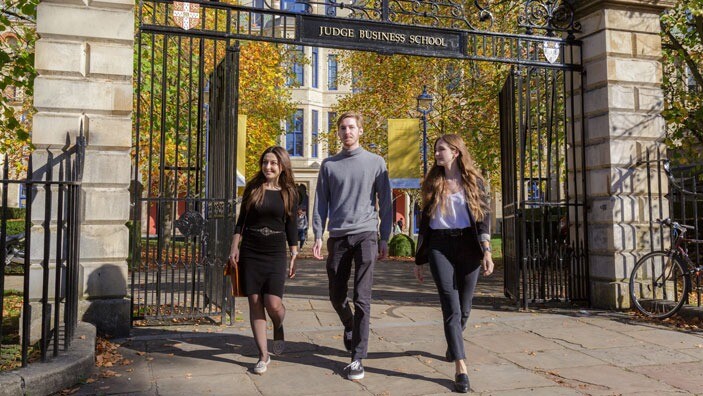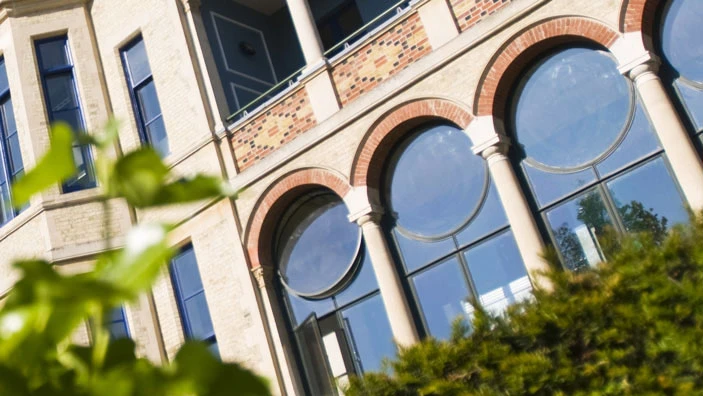Why choose a PhD at Cambridge Judge Business School?
At Cambridge Judge Business School, you will engage in research that really matters for business and society. We view research as a means to create impact far beyond our academic peers and scholars. We embed our research work, in deep engagements with organisations dealing with complex and important real-world issues. This is a key reason Cambridge Judge leads performance in the impact category in the latest UK research evaluation, with PhDs and faculty co-authors regularly publishing in leading academic journals.
The Business School has a unique position in one of the world’s greatest universities – a university that is home to more Nobel laureate affiliates than any other. Enjoy convenient proximity to the City of London and a location at the centre of the European high-tech and entrepreneurship hub, with one of the largest academic health sciences centres in Europe. This gives you the opportunity to forge close-knit networks of corporate and academic partners that are the basis for high-impact work. You will also build a lifelong network of friends from a wide range of cultures and backgrounds pursuing diverse interests and ambitions.

When I started my PhD at Cambridge Judge Business School I knew I was embarking on a challenging programme that would equip me with the resources to do original research. What I did not realise was the extent to which I was going to be a part of a vibrant and intellectually stimulating community.
Quality of supervision
As a PhD student, you will be viewed as a junior colleague in your research group preparing to become a future colleague in your research community. You will be an apprentice in the very best sense of that word.
Principal Supervisor and Advisory Committee
You will be allocated a Principal Supervisor when you continue from the MPhil to the PhD programme or alternatively at admission to the MRes programme. Your Principal Supervisor will take an active role in your research programme.
Your Principal Supervisor will be a senior academic, normally an Associate Professor or Professor, who will guide you through the programme, help you to succeed in the job market and assist you in gaining a faculty position at a leading business school. During the PhD, they will assemble a group of faculty members (an Advisory Committee) who will be actively involved in joint research with you, with the aim of producing leading academic journals publications.
During your PhD you will be encouraged to engage in joint work with faculty from other leading schools, including with our renowned academic visitors.
Apprenticeship model
Our PhD students learn via an apprenticeship model. Within supervisory relationships you learn first-hand how research is done. Through working closely with faculty you will develop your academic writing skills, your ability to tailor your writing for specific audiences/journals, your network of valuable research relationships with other leading faculty and your readiness for the academic job market.
Investment of time
To ensure close interaction between you and your Principal Supervisor, our faculty do not supervise more than 2 PhD students at any point in time. Our students frequently comment on the outstanding quality of supervision, in-depth feedback and time invested by faculty. You can expect to receive a minimum of one supervision per week. Supervision hours currently average 2 hours per week and can range up to 4 hours per week, depending on what phase a research project is in.
For me, faculty are the best aspect of Cambridge Judge Business School. They all treat me like a junior colleague. My supervisors provide incredible support whilst allowing me freedom to express my own ideas. This will be invaluable throughout my upcoming 12-month ethnography in a high security prison.
Complementary training opportunities
In addition to the core components of your PhD programme, you will find a wealth of additional valuable training opportunities on offer. You are free to utilise and design these into your own schedule.
Join other PhD students, faculty and research MPhil students one day each week over lunch. These can take the form of for example:
- a specific research presentation by a PhD student
- an expert talk about methodological issues
- career talks about the job market or publication.
A meeting point for students and faculty working in diverse areas providing an opportunity to get acquainted with other people’s work and for first year students to get a taste of advanced doctoral research. You will experience a safe, academically useful environment that nurtures the development of PhD students in terms of creating research papers and making presentations at professional seminars and conferences.
The Business School welcomes frequent academic visitors from around the world, who engage with PhD students individually and offer workshops or seminars in their areas of specialisation.
Enhance your writing skills with free, one-hour 1:1 clinics with a writing mentor.
As part of your PhD you will need to learn and develop the essential skills of teaching and assessment, an integral part of academic life. You will have the chance to provide vital assistance for our taught and executive education programmes (undergraduate, MBA, research MPhils, Executive MBA, Executive Education, professional practice masters). You may teach undergraduates, take undergraduate supervisions, run masters tutorials or review sessions, supervise masters student projects or co-teach part of a course with a member of faculty.
You will be able to take advantage of the numerous high-quality research seminars and speaker events that take place at the Business School each week. Organised by the various special interest groups, research centres and subject groups, seminars include talks by both business leaders and academics.
Training offered by other departments can help develop:
- knowledge of specialised methods (eg modules from the Faculty of Mathematics)
- interdisciplinary awareness, which inspires great research questions
You can choose to attend lectures which range from economics, finance and social science programmes to lectures on astronomy, medieval history and nanotechnology.
You’ll be entitled to attend lecture series from nearly all the University’s degree programmes (with the permission of the lecturer).
Benefit from undertaking research visits at other leading business schools. Recent research stays have included the University of Michigan, Cornell University, Northwestern University, UCLA, the University of Alberta, the University of Chicago, McGill University, University of California Berkeley and Yale School of Management.
The Experimental Laboratory is a dedicated space where you can run your own psychology and behavioural economics experiments. The lab contains 21 computers equipped with experimental software, including z-Tree (Zurich Toolbox for Readymade Economic Experiments), which allows both standalone and networked experiments.
At the lab, you’ll have access to a subject pool database and an online recruitment system, which allows you to filter participants based on different characteristics.
Attend a “Presence, Voice and Delivery” workshop for all PhDs. We also offer free, one-to-one training that focuses on aspects of voice projection, intonation and confidence, and you can book up to 3 one-hour sessions per year.
Attend a presentation skills workshop for PhD students to help you prepare for your first- year report. Access funding for language or software training (if approved by your supervisor).
The University of Cambridge also offers a comprehensive range of free researcher development courses that you can sign up for, including on presentation, negotiation and supervision skills.
Visit the University of Cambridge Researcher Development Programme to learn more.
Real-world impact
At Cambridge Judge Business School, we view real-world impact as essential. Whether it be through meaningful research, deep engagement or policy research, we want to make a difference with our research. This is the reason we focus on building active partnerships with organisations at the Business School: for business, public sector and international development. Our aim is to address real-world challenges through rigorous and methodologically sound research.
One of Cambridge Judge Business School's PhD students, Harshita Kajaria-Montag, works together with faculty member Professor Stefan Scholtes and primary care provider Granta Medical Practices to understand managerial and organisational issues hampering primary care and develops recommendations to overcome them. We talked to Harshita to ask her how her collaborative project came to be and what happened because of it.
The last few months have brought a significant disruption to labour markets around the world. While many people now feel their job is under threat or are struggling to find employment, those from vulnerable categories such as people with convictions are seeing their opportunities for a new life shrink even more rapidly and worryingly. Jan Lodge, one of Cambridge Judge Business School's PhD students, is working on this issue through a collaboration with Clean Sheet, a social enterprise helping people with convictions to re-enter the job market. We asked him some insights about his research project.
News
Helping Europol reduce illegal electronic waste trafficking – how to leverage a PhD to have impact
Cambridge Judge Business School PhD students are a vibrant community, excelling in research but also determined to make a difference in the world. Every year, their research projects bring them in close contact with non-academic organisations and their engagement helps their work go the extra mile, generating not only sound theoretical research but insights that can benefit society. Sytske Wijnsma, fourth year PhD student at Cambridge Judge Business School, is a perfect example of what PhD students can achieve when they engage with non-academic organisations as a way to develop novel and original research. For the past three years, she has collaborated with Europol, the European Law Enforcement Agency, to reduce illegal electronic waste (e-waste) disposal. We asked her to share her experience and how engagement and impact can happen already in the earliest stages of an academic career. Why did you decide to engage with Europol? When I started my PhD, I wanted to use my research to help solve pressing sustainability issues. This meant choosing an impactful topic and answering a research question that was relevant for stakeholders. I attended some non-academic conferences and heard the talk of an employee of Europol about e-waste, which immediately attracted my attention.…
College and research environment
Benefit from the Cambridge Collegiate system which puts you at the centre of a multidisciplinary, multicultural pools of friends and ideas. Our PhD students often talk about the huge impact that this has on their research.
From day one, as a PhD student you will become a full member of the Cambridge Judge research community, working together closely with faculty and other students to advance ideas, enhance each other’s work and start important academic conversations. This combination of a strong research focus, a constructive atmosphere and a highly collaborative approach creates an ideal learning environment for research students aspiring to a career in academia.

Research and skills funding
Take a look at the research and skills funding that will be available to you.
Cambridge Judge Business School
The Business School offers a generous range of grants to support MPhil, MRes and PhD students in their research. Grant applications need to be approved by your supervisor and, sometimes, by a representative from your chosen PhD pathway. We normally support requests if the course or conference applied for is appropriate and you are making good progress towards academic placement.
Cambridge Judge grants include:
- A fieldwork and conference allowance of up to £1,000 for the summer preceding the PhD.
- An automatic grant of up to £3,315 (depending on actual expenses incurred and destination) for travel to present at designated high-level conferences.
- A general allowance of £2,750 (over 4 years) that can be used for travel to present at conferences.
- A grant of up to £3,315 (depending on actual expenses incurred and destination) for travel to present at designated high-level conferences (normally one grant per year).
- 4 visiting student grants each year worth up to £3,750 to support 3rd or 4th year PhD students who want to develop affiliations as visiting scholars at top business schools or universities for a period of several months (by competitive application).
- Academic workshop grants to cover expenses associated with attending training at other European institutions (a maximum of 2 grants per year).
- Skills grants to cover all expenses associated with attending research-relevant training courses (if such training is not offered for free within the University of Cambridge), eg language or software training.
- Proofreading, for when a paper is ready for submission to a journal.
- Free printing.
- Monetary prizes for outstanding grades, the best Spring Doctoral Conference papers and student input in organising the conference and regular research lunches, which can be put towards any research expenses.
University fieldwork funding
If you’ve been given leave to work away from Cambridge, you can apply to the University’s School of Technology for fieldwork expenses (excluding accommodation and living expenses) so long as these costs haven’t been met by a research council or other funding source.
College funding
Many Colleges provide funding for conference and fieldwork. The allowances can vary widely by College, so we recommend referring to individual College websites for details of what can you apply for at your particular College.
Resources for PhDs
Take advantage of the key resources that will help facilitate your study and research.
PhD room and office facilities
As a PhD student you will be allocated a workspace in either the PhD rooms or an office adjacent to faculty members from the relevant subject group. This workspace includes a desk, a PC, storage space and access to nearby printing facilities.
PCs
You will be allocated your own School PC, giving you access to the full suite of research software available at Cambridge Judge Business School. VPN remote access allows you to connect to your PC from anywhere in the world, which is ideal for when you’re away from Cambridge doing fieldwork.
Additional software programmes may be installed upon request. If you encounter any IT-related issues, our large IT team will be there to provide first-class support.
Libraries
The Business School’s Information & Library Services provides a wealth of information resources, including a world-class range of databases covering company and financial data, industry and market reports, global news and much more. You will also have access to numerous e-journals and e-books as well as a rich collection of printed books and journals.
While many Information & Library Services resources are available electronically, you’ll also find our main Information Centre on the ground floor of the Cambridge Judge building. Here, our excellent team of information professionals can help you with a wide range of matters, such as if you are undertaking multidisciplinary research and need help accessing resources elsewhere in the University or further afield.
They also offer 1:1 training and research support at any time as well as scheduled group training on relevant tools such as NVivo, Zotero and Qualtrics software. If you’re looking for help with social media as a research tool or how to manage your research data efficiently, the Information & Library Services team are the people to talk to – just set up an appointment or drop-in to the Information Centre for a chat.






Social activities
You’ll find that there are many opportunities to socialise with PhD and research masters students and faculty members throughout the year, including:
As a member of the University, you also have wealth of social and sporting activities available to you.
Find out more about Cambridge life